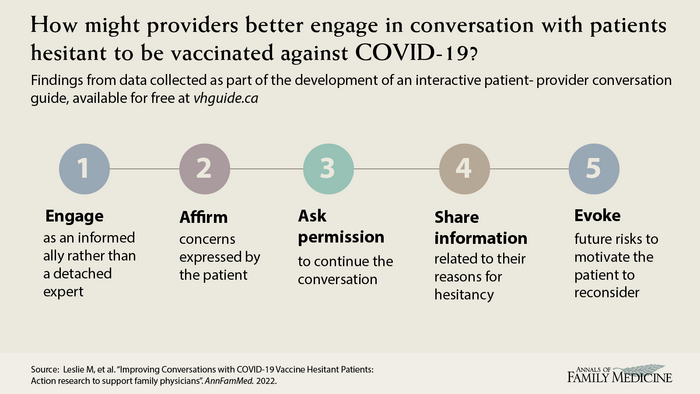Public health researchers develop web-based guide to help family physicians address COVID-19 vaccine hesitancy

image: How might providers better engage in conversation with patients hesitant to be vaccinated against COVID-19? Findings from data collected as part of the development of an interactive patient-provider conversation guide, available for free at vhguide.ca. view more
Credit: Annals of Family Medicine
Public health researchers in Canada developed an interactive, web-based guide to help family physicians better address a wide range of patient concerns related to the COVID-19 vaccine. To ensure relevancy, the researchers conducted qualitative interviews with primary care physicians in multiple Canadian provinces. The data was then used to identify commonly held beliefs, attitudes and perceptions that impact a patient’s willingness to receive the vaccine.
The research team found that physicians frequently encountered many of the same reasons for COVID-19 vaccine hesitancy, including concerns around safety; interactions with co-morbidities; conspiracy theories; religious or moral restrictions; and past traumas experienced in the medical setting. Using this information, researchers created several physician resources to help better counsel vaccine-hesitant patients, in direct response to each potential concern.
Additionally, the free guide outlines four steps to help physicians have better conversations with vaccine-hesitant patients, emphasizing the physician’s role as an ally on the patient’s health journey. Steps include engaging with patients; affirming patient concerns; asking permission before sharing information; and evoking future risks to motivate patients to reconsider vaccine hesitancy. The guide is available atwww.vhguide.ca.
Journal
The Annals of Family Medicine
Article Title
Improving conversations with COVID-19 vaccine hesitant patients: Action research to support family physicians
Disclaimer: AAAS and EurekAlert! are not responsible for the accuracy of news releases posted to EurekAlert! by contributing institutions or for the use of any information through the EurekAlert system.
This article has been archived for your research. The original version from EurekAlert can be found here.


